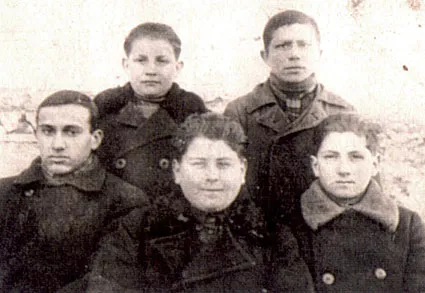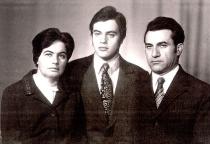This is me, the first from the left standing. My friends are with me: in the lower row next to me are Misha Liberchuk and Lev Vizel', standing from left to right - Nathan Shriftman and Nathan Shleifman, the late 1930s.
There were five schools in Krasilov: one Jewish primary school, three 7-year schools: one Jewish, one Polish and one Ukrainian and a Ukrainian 10-year school. My friends were one year older than I. On 1 September 1930 they went to the first grade and I joined them. I liked the primary school teacher Mirra Hovar, a tall, stately, nicely dressed lady with her hair neatly done. She took her new schoolchildren to their classroom, but she sent me away saying that I was too young to go to school yet. I ran to my mother's shop and begged my mother to help me go to school. My mother managed to convince the teacher and she let me stay in class few days. I stayed in the classroom two days and then didn't want to go to school again. It was hard to stay quiet for long and I felt like going to play with my friends. In 1931, a year later, I went to the first grade of this Jewish primary school and I enjoyed going to school. I dreamt of playing the balalaika! There was a folk orchestra in our school and I kept nagging at home: 'I want a balalaika, buy me a balalaika'. A balalaika cost 3 rubles, but it was too much for our family to spend 3 rubles. I kept asking for a balalaika for three years until my father bought it and I joined our folk orchestra. However, I was no good at hearing the tunes and soon I was expelled from the orchestra and after that I put away my balalaika.
I remember famine in 1932-33. My father occasionally received rationed food at work. My mother, my sister and I went to gather spikelets in the field. My mother went after work and my sister and I - after school. On weekends we gathered them from morning till night. My mother received 300 grams of bread and one herring for what we gathered.
In 1937, when I turned 13, I had bar mitzvah. Of course, this was done in secret, but my grandfather taught me all details: how to handle tefillin and pray. I was a pioneer already and if somebody got to know about it at my father's work or at school it would have caused a problem. I went to pioneer meetings and liked Soviet holidays 1 May and October revolution days. Local Soviet and party officials stood on the stand in the central square during parades. I liked this as well and it was in no conflict with the Jewish ritual of coming of age. Soviet holidays were days off and we had a festive dinner and enjoyed our free time.

















